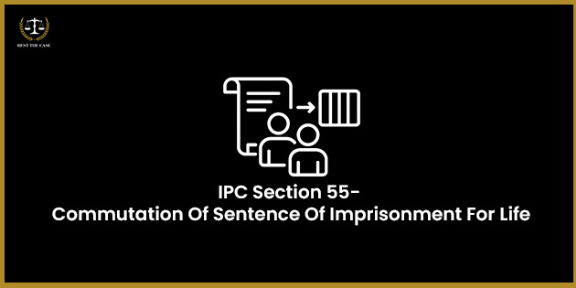IPC
IPC Section 55 - Commutation Of Sentence Of Imprisonment For Life

While imprisonment for life is among the most serious punishments under Indian criminal law, the justice system still provides mechanisms for mercy and reform. Section 55 of the Indian Penal Code (IPC) empowers the appropriate government to commute a life sentence, that is, reduce the sentence without the convict's consent. This provision showcases the Indian legal system’s intent to balance justice with compassion. Even in cases involving life imprisonment, there is a possibility of reconsideration through executive discretion.
In this blog, we’ll explore:
- The legal meaning of commutation under IPC Section 55
- How it differs from pardon or remission
- Who has the authority to commute a life sentence
- The legal process and real-life application
- Key examples and constitutional backing
What Is IPC Section 55?
Legal Definition:
"In every case in which sentence of imprisonment for life shall have been passed, the appropriate Government may, without the consent of the offender, commute the punishment for imprisonment of either description for a term not exceeding fourteen years."
Simplified Explanation:
- Commutation here means reducing the life sentence to a fixed-term imprisonment.
- The power lies solely with the appropriate government (either Central or State), which can commute the sentence up to a maximum of 14 years.
- The consent of the prisoner is not required.
- This is an executive power, exercised outside the judiciary, often on grounds of good conduct, age, health, or humanitarian considerations.
Commutation vs. Pardon: Key Differences
Feature | Commutation | Pardon |
|---|---|---|
Authority | Appropriate Government (under IPC & CrPC) | President (Article 72) or Governor (Article 161) |
Consent Required? | No | No |
Legal Effect | Reduces punishment (e.g., life to 14 years) | Erases punishment completely |
Timing | After conviction | After conviction |
Partial Relief? | Yes | Yes |
Who Is The “Appropriate Government”?
The definition varies based on the nature of the crime:
- Central Government: If the offence is against central laws or investigated by central agencies.
- State Government: For offences under state jurisdiction and tried in state courts.
The decision to commute must align with Sections 432 and 433 of the CrPC, which govern remission, suspension, and commutation procedures.
When and How Can a Life Sentence Be Commuted?
Commutation may be considered in the following scenarios:
- Based on a mercy petition or recommendation from jail authorities
- Due to old age, terminal illness, or mental/physical infirmity
- After significant duration of sentence served (often more than 14 years)
- On the basis of good conduct in prison
- Due to humanitarian or political considerations
Importantly, no judicial retrial is involved. The decision is purely executive, although often made in consultation with legal, judicial, and correctional departments.
Legal And Constitutional Context
Section 55 is supported and supplemented by:
- Article 72 – Power of the President to commute sentences
- Article 161 – Power of the Governor to grant commutation
- CrPC Sections 432 & 433 – Executive powers for remission and commutation
- Supreme Court rulings, such as Gopal Vinayak Godse v. State of Maharashtra, affirm that life imprisonment means imprisonment for the entire natural life, unless lawfully remitted or commuted
Real-Life Examples
Example 1: Commutation After 14+ Years
In many states, convicts serving life sentences for over 14 years with clean conduct records have been granted commutation as part of Independence Day or Republic Day releases.
Example 2: Humanitarian Grounds
Elderly convicts or those with terminal illnesses have seen their sentences commuted in recognition of their dignity and health rights.
BNS Update
Under the Bharatiya Nyaya Sanhita (BNS), 2023, IPC Section 55 corresponds to Section 5. The new code retains the original principle, empowering the government to reduce a life sentence to a term not exceeding 14 years. No major change has been made in terms of procedure or discretion.
Conclusion
Section 55 of the IPC is a crucial component of India’s legal architecture that tempers strict punishment with the possibility of executive mercy. It acknowledges that while life imprisonment is severe, it need not always be final. Through this provision, the law allows room for redemption, review, and relief, guided by humanity and justice. In a justice system where life imprisonment still exists, Section 55 reflects the principle that no punishment is beyond reconsideration.
Frequently Asked Questions
Q1. What is commutation under IPC Section 55?
It refers to the reduction of a life imprisonment sentence to a fixed term (not exceeding 14 years) by the government, without needing the convict’s consent.
Q2. Who can commute a life sentence in India?
The appropriate government (central or state) has this power under IPC Section 55 and CrPC Sections 432–433.
Q3. Is there a minimum sentence under Section 55?
No minimum is specified, but the maximum fixed term after commutation is 14 years.
Q4. Is Section 55 still valid under the new criminal law?
Yes, It has been retained as Section 6 of the Bharatiya Nyaya Sanhita, 2023.
Q5. Does commutation mean automatic release?
No, commutation is a discretionary decision by the government. Life convicts are not automatically released after 14 years unless commutation is granted.






